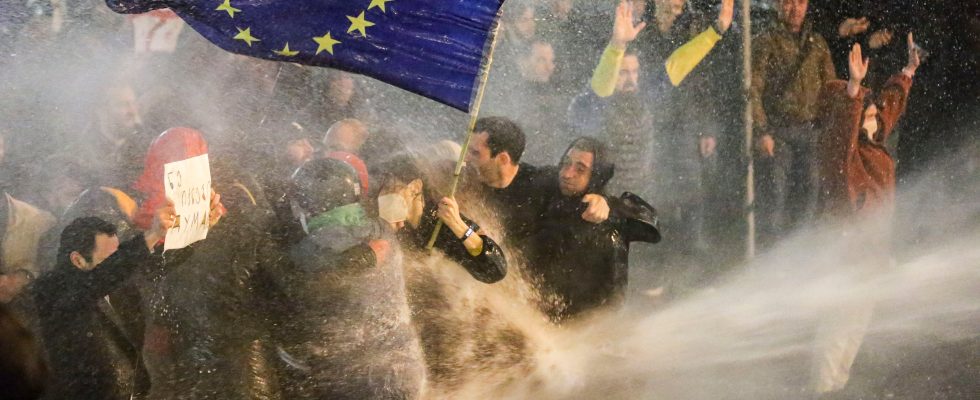“No to Russian law!” chanted the crowd in front of the police, brandishing, outside the parliament, the national flag and that of the European Union which Georgia aspires to join. More than 10,000 demonstrators gathered on Monday evening, April 15, in Tbilisi, Georgia, against the controversial bill on “foreign agents”.
This text, inspired according to its opponents by a Russian law used for years by the Kremlin to persecute dissident voices, was already the cause of large-scale demonstrations last year.
The first version was abandoned last year after protests gathered tens of thousands of people in Tbilisi in March 2023. The ruling party in this Caucasian country, the “Georgian Dream”, announced in early April the return of this controversial bill. According to its detractors, the law would, if it passes, be a way of silencing dissident voices in power, as is the case in Russia.
Intimidate NGOs and dissident voices
The text would force organizations receiving more than 20% of their funding from abroad to register under the infamous label of “organization pursuing the interests of a foreign power”, under penalty of fines. The government is defending a bill that will require organizations to demonstrate more “transparency” about their funding. Critics of the text see it as a tool for intimidating NGOs and independent media. According to experts interviewed by AFP, the ruling party, accused of secretly collaborating with the Kremlin, considers the financing of certain NGOs and media by Westerners as a challenge to its control over the country.
“Georgia will not be admitted to the EU with such anti-democratic laws, that’s why we will not let them pass,” said Giorgi Lachkhi, a dentist in the crowd. “Georgia belongs to Europe, it will never again be Russia’s backyard,” he added. In December, Georgia was granted official candidate status for membership in the European Union, but Tbilisi still needs to make judicial and electoral reforms, strengthen press freedom and curb the power of oligarchs before that negotiations are actually launched.
Neutralize European influence
If Georgia has had the ambition for years to deepen its relations with the West, the ruling party is accused of wanting, on the contrary, to bring this former Soviet republic closer to Russia. The Georgian Prime Minister, Irakli Kobakhidzé, known for his anti-Western rhetoric, defends himself against any sabotage of the EU accession process, although Brussels has called for the text to be abandoned.
But “the Georgian Dream does not hide the fact that the law aims to neutralize Western influence”, underlines political scientist Ghia Nodia. “The party keeps saying that it is leading Georgia towards the EU, but in fact it is sabotaging Georgia’s European path”, which is supported by around 80% of the population, according to opinion polls, says -he.
Last week, around 8,000 people had already demonstrated against the bill in the Georgian capital. On April 15, four demonstrators have already been arrested by the police, according to AFP. Earlier in the day, when the debates began between the deputies on this text, several elected officials came to blows in the middle of the hemicycle.
The return of the text to Parliament could also reignite tensions between the ruling party and President Salomé Zourabichvili. In 2023, she openly supported the protesters. “Georgia will not surrender to re-Sovietization!” declared on X President Salomé Zourabichvili, a fierce supporter of rapprochement with the EU, but whose prerogatives are however limited.
